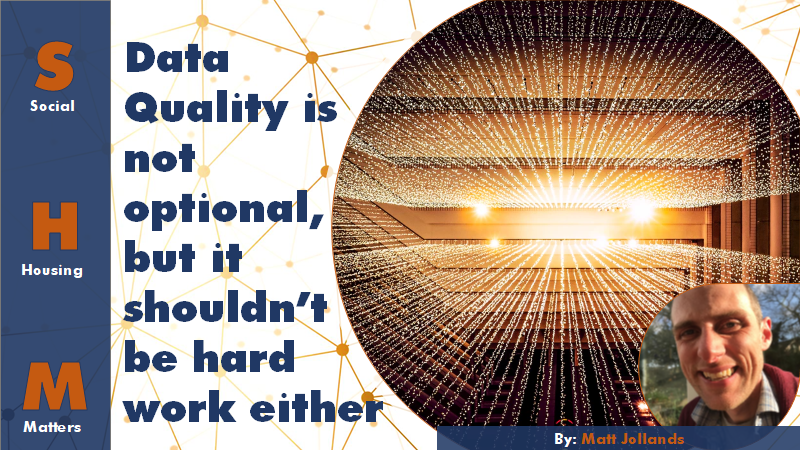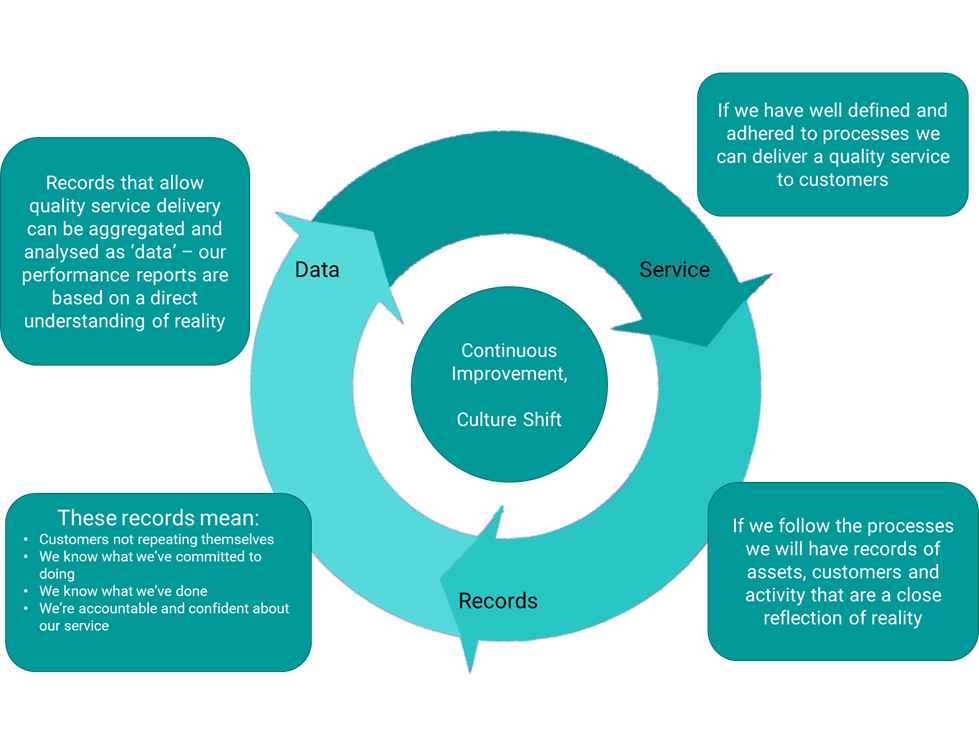
By: Matt Jollands ![]() @JollandsMatthew
@JollandsMatthew
I’ve worked in and around social housing for the best part of a decade, and through discussion with peers, observations of the industry and current discussions sector wide I believe that there is an issue with data in UK social housing. Housing Associations love to talk about being ‘data driven’, but if we’re honest, in most circumstances the data that drives decisions, allows performance management and benchmarking, and ultimately could help to improve the service that tenants receive is patchy at best, and unusable at worst.
If you’ve spent any time in social housing, you’ll know that core processes are run from spreadsheets (saved to Clive’s desktop) and that ‘KPI’ are often derived from untraceable self-marked homework. This is not to say that these issues are universal, and we must understand that while these seemingly illogical half-processes, archaic storage solutions and institutional knowledge have been inherited and refined over the course of decades.
Some people will take the view that ‘if it ain’t broke, don’t fix it’ and that we shouldn’t upset the status quo. This way of working just works and sure, things get missed, but don’t they anywhere? And anyway, housing is special.
I don’t believe this.
We live in a time where data is king, where processes in commercial settings are automated, where I know exactly (give or take) when my take-out/taxi/groceries/craft beer order will arrive at my door, and I can order them without a single human interaction. This doesn’t happen by magic. This happens because records are complete, checked, verified, stored in a usable database, and linked correctly to other sources of information.
Housing must do better, not because data is a fad, not because it’s the thing that our peers are (saying that they’re) doing, but because we are duty bound to provide the best service possible to our tenants, who, let’s not forget, don’t exactly have a wide choice of providers in any given area.
Is it ever acceptable for a tenant to ring their housing provider multiple times to book appointments for repairs, check their balance, pay a bill, raise a complaint, ask for help? Of course, it isn’t.
Imagine the scenario:
I’ve booked the weekly shop and received the notification “thank you Mrs Jollands, your order will be with you between the 1st and the 3rd”. I’m not Mrs Jollands, I can’t stay at home for three days for an unspecified delivery slot.
Some time on the 2nd a van turns up “we’ve not got the things you’ve asked for, no one told us what you wanted, we’ll go away and get your order now”
3 days later, I ring again “We’ve closed your order, a driver attended”
This is clearly mad, and you’d never go to that shop again. But what if it was your only choice?
Data, process, and culture
I know now you may well be saying, yes, but the scenario you’ve laid out above is due to a lack of process, and not focusing on customer (tenant) satisfaction, it has nothing to do with data. This, from my perspective is the main issue with social housing providers in the UK: Data is seen as a different, separate job, owned by IT (or governance, or BI, or just someone that isn’t me). Data is a burden, something that you have to do in addition to your job.
This may have some basis in truth, but only if you do not have a culture in your organisation that recognises that a conversation that Phil had with a tenant is only as valuable as the record of it to the business. If Wilma and Rachel and Matt then all need to have the same conversation not only are you wasting time and resources, but you’re breaking the chains of trust that you need to build in the tenant-landlord relationship. Culture should inform us that we need to create institutional knowledge – if 123 Fake Street is a three bed semi built in 1960 that is only known by the organisation if the record of that property tells us that, it’s no good if the system tells us that while Harold knows full well that it was built in 1982 and is a flat, but never told the system.
The service we provide, and the records thereof should create the data that we need to understand both the quality of our service, and the current gaps in our data collection storage, use and management.

So What?
I’m not saying that I have all of the solutions, I possibly don’t have any at all, but what I can say is, it’s time to stop with the data cleanses, the tenant censuses, the system reconciliations and its time to think strategically, and holistically about the service that we offer, the expectations and needs of tenants and how we can build processes that work for them. If you would not accept poor service, why should anyone else? Don’t hide behind your ‘95% customer satisfaction score’ – it’s not representative, don’t hide behind ‘that’s how we do it’ – it doesn’t have to be.
If your processes work, if your culture values institutional knowledge, if we shift the conversation from ‘data’ to ‘record keeping’ and providing the tenants with the best possible service we can, data will follow.
This isn’t a matter of fixing the past, of cleaning up what is already there, if you check a tenant’s details on every contact that census becomes redundant, if you fix a problem at source, not in a spreadsheet later, that data cleanse becomes redundant, if you hold employees to account for the quality of record keeping, and build a process to fix issues, those reconciliations will cease to be needed. Then, and only then, can we discuss being ‘data driven’ (and that, is a rant for another day…).
About the Author:
Matt Jollands has worked in research and data roles in the public sector for over a decade. For seven of those years he has worked in analytics and data management in the social housing sector. He is interested in improving data quality, and making data work to improve frontline services, not just data for data’s sake. He currently runs performance, analytics and data quality for a small Housing Association in South West England. You can find him on LinkedIn, Twitter and he’s always happy to engage with peers.



